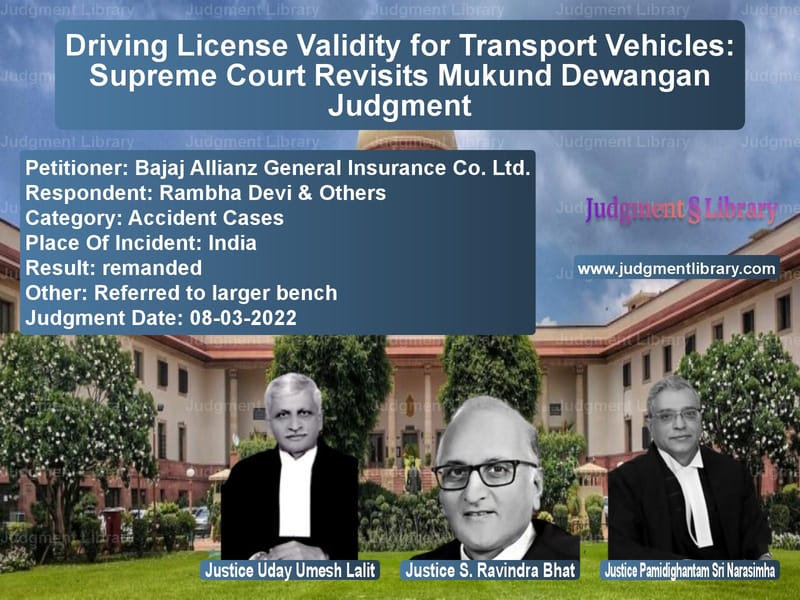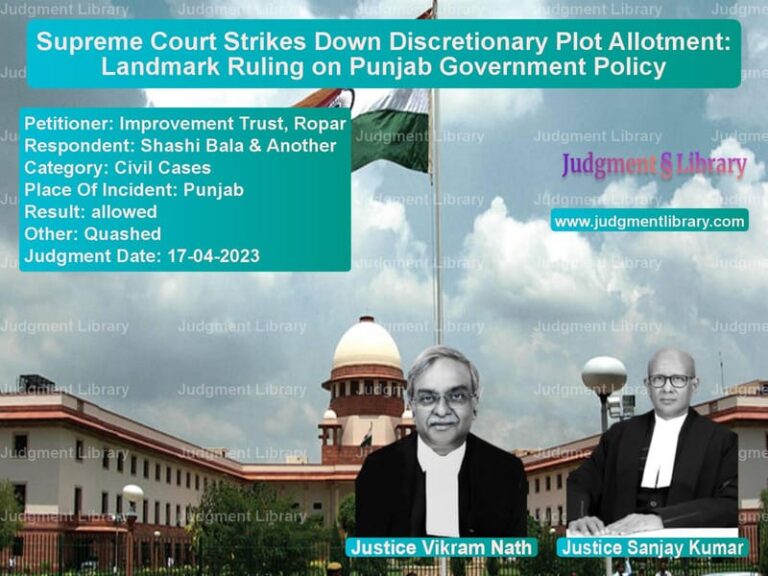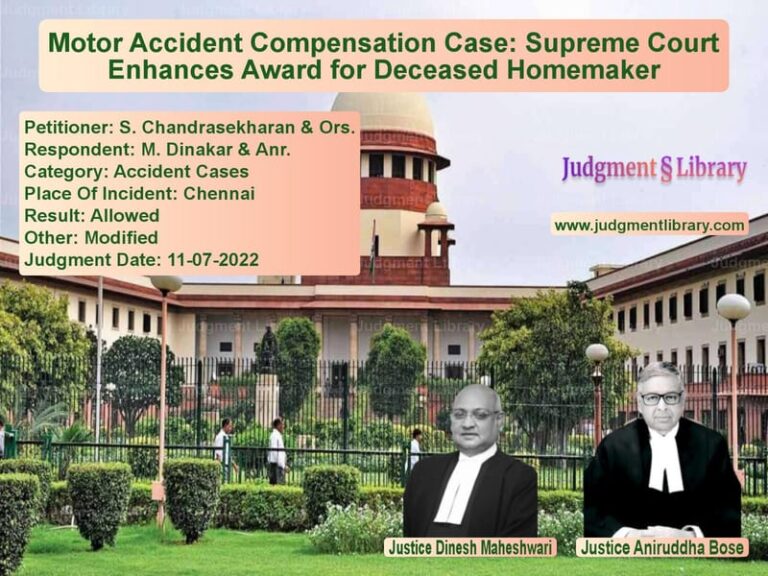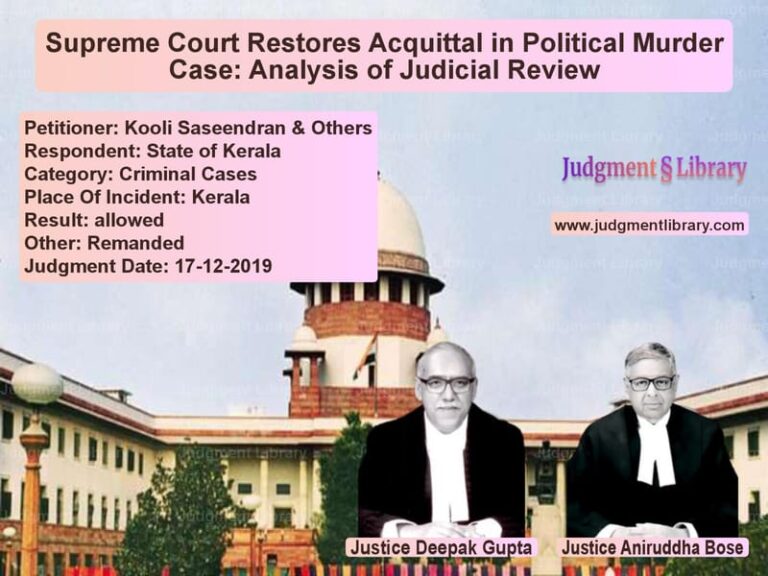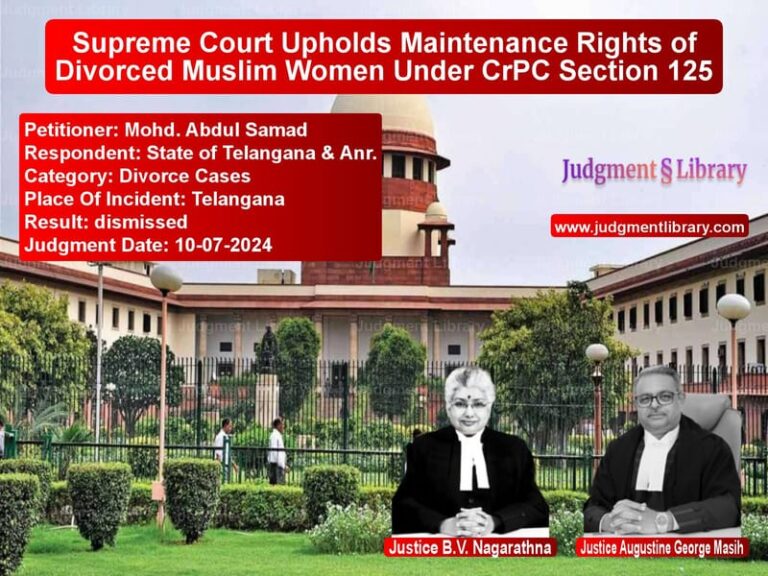Driving License Validity for Transport Vehicles: Supreme Court Revisits Mukund Dewangan Judgment
The Supreme Court of India recently revisited the interpretation of driving license requirements for transport vehicles in the case of Bajaj Allianz General Insurance Co. Ltd. vs. Rambha Devi & Others. This case primarily dealt with whether a person holding a driving license for a light motor vehicle (LMV) could legally drive a transport vehicle of light motor vehicle class without an additional endorsement.
Background of the Case
The dispute arose from multiple appeals related to motor accident claims. The insurance companies challenged the liability imposed on them, arguing that the drivers involved in the accidents only had LMV licenses but were driving transport vehicles such as goods carriers or commercial vehicles without specific endorsements. The insurers relied on the requirement under the Motor Vehicles Act, 1988, which mandates a separate endorsement for transport vehicles.
The issue stemmed from the previous ruling in Mukund Dewangan v. Oriental Insurance Co. Ltd., where a three-judge bench of the Supreme Court held that an LMV license was sufficient to drive a transport vehicle, provided the gross vehicle weight did not exceed 7500 kg. This interpretation meant that a separate endorsement was not necessary for such vehicles.
However, the insurance companies contended that the ruling in Mukund Dewangan ignored several statutory provisions that differentiated between LMVs and transport vehicles.
Key Legal Issues Considered
- Whether the interpretation in Mukund Dewangan was correct in allowing LMV license holders to drive transport vehicles.
- Whether the provisions of the Motor Vehicles Act, particularly Sections 3, 4, 7, and 14, were overlooked in Mukund Dewangan.
- Whether different standards of training and licensing exist for transport vehicles.
- The impact of the ruling on road safety and insurance liability.
Petitioner’s Arguments (Bajaj Allianz General Insurance & Others)
- The Motor Vehicles Act clearly differentiates between transport vehicles and non-transport vehicles.
- Section 3 of the Act mandates a specific endorsement for driving transport vehicles, which was ignored in Mukund Dewangan.
- Section 4(2) of the Act states that no person under the age of 20 years can drive a transport vehicle, highlighting stricter rules for such vehicles.
- Rule 31 of the Central Motor Vehicles Rules, 1989, provides different training requirements for transport vehicle drivers.
- The insurance companies should not be held liable for claims where the driver did not possess the required endorsement.
Respondent’s Arguments (Claimants & Others)
- The Mukund Dewangan ruling provided a clear interpretation that had been followed for years.
- Requiring additional endorsements for transport vehicles in the LMV category would create unnecessary legal hurdles.
- Many accident victims had already been compensated based on the existing interpretation.
- Any change in the ruling should not apply retrospectively, as it would disrupt existing claims.
Supreme Court’s Observations
- The Court acknowledged that certain provisions were not considered in Mukund Dewangan, such as the need for additional training for transport vehicle drivers.
- It noted that the differentiation between LMVs and transport vehicles exists in the licensing process and eligibility requirements.
- The Court was concerned that the ruling in Mukund Dewangan might have unintentionally diluted road safety regulations.
- The case was referred to a larger bench for reconsideration to avoid legal inconsistencies.
The Court stated:
“The referral order correctly notes that certain provisions of the Motor Vehicles Act were not adequately examined in Mukund Dewangan. Given the implications on road safety and insurance liability, a larger bench must revisit the issue.”
Final Judgment
- The Supreme Court referred the matter to a larger bench.
- The existing ruling in Mukund Dewangan was not overturned but kept under reconsideration.
- Insurance companies were directed to continue compensating victims based on previous court orders until a final decision is made.
Key Takeaways from the Judgment
- Legal clarity on transport vehicle licensing: The case highlights the need for a clear distinction between LMVs and transport vehicles.
- Impact on insurance claims: The ruling affects how insurance companies determine liability in motor accident cases.
- Potential policy changes: The outcome may lead to stricter licensing requirements for transport vehicle drivers.
- Road safety considerations: The case reinforces the importance of proper training for transport vehicle drivers.
Conclusion
This Supreme Court ruling marks a critical moment in interpreting the Motor Vehicles Act. By referring the case to a larger bench, the Court acknowledges the complexity of the issue and the need for a balanced approach that ensures road safety while maintaining legal consistency. The decision will have far-reaching consequences for vehicle licensing, insurance liability, and accident claim settlements in India.
Petitioner Name: Bajaj Allianz General Insurance Co. Ltd..Respondent Name: Rambha Devi & Others.Judgment By: Justice Uday Umesh Lalit, Justice S. Ravindra Bhat, Justice Pamidighantam Sri Narasimha.Place Of Incident: India.Judgment Date: 08-03-2022.
Don’t miss out on the full details! Download the complete judgment in PDF format below and gain valuable insights instantly!
Download Judgment: bajaj-allianz-genera-vs-rambha-devi-&-others-supreme-court-of-india-judgment-dated-08-03-2022.pdf
Directly Download Judgment: Directly download this Judgment
See all petitions in Motor Vehicle Act
See all petitions in Compensation Disputes
See all petitions in Road Accident Cases
See all petitions in Negligence Claims
See all petitions in Insurance Settlements
See all petitions in Judgment by Uday Umesh Lalit
See all petitions in Judgment by S Ravindra Bhat
See all petitions in Judgment by P.S. Narasimha
See all petitions in Remanded
See all petitions in Referred to Larger Bench
See all petitions in supreme court of India judgments March 2022
See all petitions in 2022 judgments
See all posts in Accident Cases Category
See all allowed petitions in Accident Cases Category
See all Dismissed petitions in Accident Cases Category
See all partially allowed petitions in Accident Cases Category

